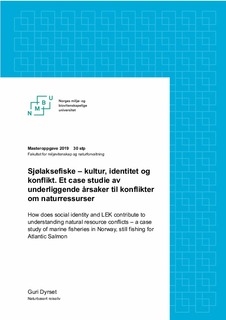| dc.contributor.advisor | Stensland, Stian | |
| dc.contributor.advisor | Lusine, Margaryan | |
| dc.contributor.author | Dyrset, Guri | |
| dc.coverage.spatial | Norway | nb_NO |
| dc.date.accessioned | 2019-12-04T14:45:43Z | |
| dc.date.available | 2019-12-04T14:45:43Z | |
| dc.date.issued | 2019 | |
| dc.identifier.uri | http://hdl.handle.net/11250/2631807 | |
| dc.description.abstract | Det har vært en nedgang i biologisk og kulturelt mangfold de siste tiårene og mye kunnskap om vår plass i naturen går tapt. Denne artikkelen ser på konflikter om naturressurser gjennom et case-studie av sjølaksefisket i Midt-Norge. Det har vært en stor nedgang i antallet sjølaksefiskere og denne tradisjonen og kultur er i ferd med å forsvinne. Sosial identitet og lokal økologisk kunnskap (LEK) brukes for å forstå og beskrive de underliggende årsakene til konflikter om naturressurser og hvordan dette påvirker en marginalisert gruppes kamp for å bevare egen identitet og kultur. Den diskuterer hvordan maktforholdet mellom ulike meningsbærere, forskning og forvaltning, fører til en eskalering i konfliktnivået. Studien argumenterer for at offentlig forvaltning og tidligere forskningsfokus på økonomiske og sosiale forhold får konsekvenser og fører til tap av kulturelle, tradisjonelle verdier og hemmer utvikling. Studien konkluderer med at sosial identitet er tilknyttet naturen gjennom kultur, historie og tradisjoner. Videre er det nødvendig med mer kunnskap og at sjølaksefisket i større grad tas inn i forvaltningen. Dette kan redusere konfliktnivået, heve kompetansen (LEK og vitenskapelig), bidra til nye løsninger og en gjensidig forståelse av bevaring av kulturelt og biologisk mangfold. | nb_NO |
| dc.description.abstract | It has become widely acknowledged that nature and its vital contributions to people, which together embody biodiversity and ecosystem functions and services, are deteriorating worldwide. There has been a decline in the total abundance of Atlantic salmon during the last three decades, and the tradition and culture of marine fisheries for Atlantic salmon are also disappearing. This article looks into conflicts around natural resources through a case-study of a small group of marine fisheries in Norway, still fishing for Atlantic Salmon (Salmo salar). Theoretical lens of social identity and local ecological knowledge (LEK) is used to understand the underlying causes and the complexity of a resource use conflict, how it affects a marginalised group of fishermen fighting for their rights, culture and identity. Further, this article discusses power relations, the interplay between management, science and the local culture, resulting in a conflict. The article shows that conflicts around natural resources are normally framed in economic, social or biological terms, whereas cultural and traditional values remain invisible yet powerful drivers of action. It concludes that more knowledge is needed in this field, and the marine fisheries culture should be included more in managerial and scientific decisionmaking. A more inclusive approach can contribute to mitigating conflicts, raising competence (LEK and scientific knowledge), finding new solutions and a mutual understanding for the preservation of cultural and biological diversity. | nb_NO |
| dc.language.iso | nob | nb_NO |
| dc.publisher | Norwegian University of Life Sciences, Ås | nb_NO |
| dc.rights | Attribution-NonCommercial-NoDerivatives 4.0 Internasjonal | * |
| dc.rights.uri | http://creativecommons.org/licenses/by-nc-nd/4.0/deed.no | * |
| dc.title | Sjølaksefiske : kultur, identitet og konflikt : et case studie av underliggende årsaker til konflikter om naturressurser | nb_NO |
| dc.title.alternative | How does social identity and LEK contribute to understanding natural resource conflicts : a case study of marine fisheries in Norway, still fishing for Atlantic Salmon | nb_NO |
| dc.type | Master thesis | nb_NO |
| dc.description.localcode | M-REIS | nb_NO |

